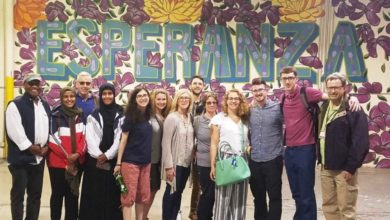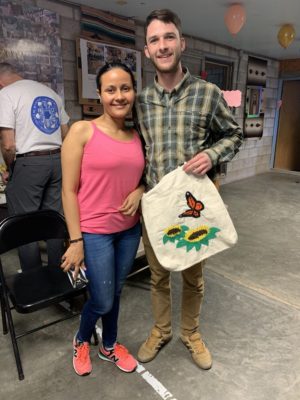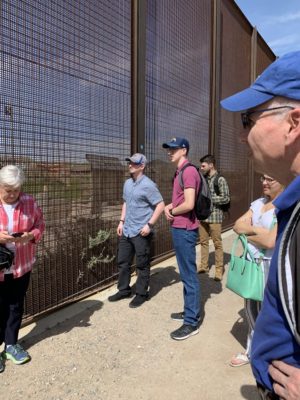April 1, 2020
Local interfaith leaders, students bring lessons home from border trip
REGIONAL
By Sharon Roulier

Father Warren Savage (left) poses with students and group leaders during a recent immersion trip to the U.S.-Mexico border. (iObserve photos courtesy of Father Warren Savage)
SPRINGFIELD – A group of interfaith leaders and college students from western Massachusetts traveled to El Paso, Texas and its Mexico border town of Juarez last month for a six -day immersion trip to foster a better understanding of religious teachings on immigration and race.
Father Warren Savage, a priest of the Diocese of Springfield who serves as director and Catholic chaplain of the Albert and Amelia Ferst Interfaith Center at Westfield State University, led the group.
The immersion spring break trip was made possible in part through a $4,000 grant from the Interfaith Youth Core, a national non-profit organization working to bridge faith and worldview differences on college campuses.
During the trip, eight students from various faith traditions – two Muslims, two Jews and four Christians — along with trip leaders met with immigration lawyers, border patrol officials, and individuals who run shelters for those seeking asylum. They also visited a temple, a clinic, a pre-school, and a library.
“Our proposal was to train student leaders to dialogue and collaborate within the issues of immigration and race within the campus community and beyond. We want to have civil and informed conversations on immigration and race across racial boundaries,” said Father Savage.

Springfield College student Michael Mollica poses in Juarez, Mexico with an asylum seeker who made the bag to earn money for her legal fees.
One highlight of the immersion trip was a visit to Casa Oscar Romero in El Paso, a Catholic Church-sponsored shelter that has offered temporary shelter to thousands fleeing Central America and trying to settle in the United States. There, the students visited immigrants living in the shelter who are awaiting permission to travel to relatives in parts of the United States. They also prepared a meal and served it.
“We must have served 50 women immigrants from Honduras, Guatemala, Nicaragua, Cuba, Iran and El Salvador,” said Father Savage. He noted that the Catholic Church’s teaching is grounded in the Gospel mandate to “love your neighbor.”
“They must see immigrants and refugees and migrants as their neighbors and our teaching says we must welcome the stranger, love the neighbor,” he said. “I want our Catholic Christian students to live from the source, which is the Gospel and our Catholic tradition. They cannot live it if they do not know it.”
While the students stayed on the United States side of the border, some of the leaders, including Sister of St. Joseph Jeanne Branchaud, traveled to Juarez.
Sister Branchaud is assistant Newman Club advisor at Westfield State University. In a reflection, said she was reminded of the plight of 1980s martyred missionary Jean Donovan, who in the midst of the violence in El Salvador wrote in a letter:
“The Peace Corps left the country today and my heart sank low. The danger is extreme and they are right to leave… Several times I have decided to leave El Salvador. I almost could, except for the children, the poor, bruised victims of this insanity. Who would care for them? Whose heart could be so staunch as to favor the reasonable thing in a sea of their tears and helplessness? Not mine, dear friend; not mine.”
“It’s 2020. The victims of this insanity at any of the U.S. borders are the children,” said Sister Branchaud. “Yes, men and women suffer, too, and I want to remember that these victims of political insanity are someone’s children as well as children of God.”
Sister Branchaud said she was moved by the stories she heard from mothers with their children she met who had traveled for miles to escape violence in search of a better life.
“We listened to their stories of struggle and loss threaded with hope. We played with them, laughed with them,” she said. “These women and their little ones gave us the greatest gifts. They opened our hearts to love, given and received.
“They accepted us as we were, and we accepted them as our neighbor, as our brothers and sisters,” she added. “May we journey together to help them obtain the hope and the freedom they so desire.”

People view the U.S.-Mexico border wall in El Paso, Texas.
Colleen Mollica, a Westfield State University campus ministry intern, is working on a master’s degree in applied theology at Elms College in Chicopee. She was instrumental in writing the grant proposal for the immersion experience. She attended the March 10-15 trip with her son, Michael, a Springfield College student.
Colleen Mollica said the experience served to educate the students and leaders on the legal complexities involved in immigration and asylum.
“I believe that while we can sympathize with the needs of others by reading about it or seeing it on the news, it is not until we have the opportunity to actually experience or see firsthand that we can begin to truly understand their plight,” she said. “I believe it is in the experience that we are moved to action.”
Michael Mollica said he agreed with his mother.
“We read so much about the issues at the border that we can easily become desensitized or easily tune out what is happening with what we see on the news,” he said.
Michael said that one encounter he had with a woman at Casa de Acogida in Anapra, Ciudad Juarez, literally brought him to tears. Women in the poor neighborhood there made handmade bags to sell to raise money for their legal fees. Each bag had a tag with a personal story of the woman who made it.
As he was reading the tag of the bag he purchased, he looked up and realized he was reading the story of one of the women standing right in front of him.
“At that moment, I became aware that I can no longer take seemingly distant news stories about immigrants lightly, nor can I ignore the cries of our immigrant brothers and sisters,” he said.
Colleen Mollica concluded by speaking for the group. “Everyone came away from the trip with a bigger heart and empowered with more knowledge to educate others on the realities of what is happening at the border.”


 Facebook
Facebook Youtube
Youtube
